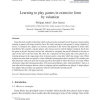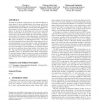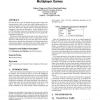106 search results - page 2 / 22 » Modeling player session times of on-line games |
CORR
2002
Springer
13 years 5 months ago
2002
Springer
Game theoretic models of learning which are based on the strategic form of the game cannot explain learning in games with large extensive form. We study learning in such games by ...
MM
2010
ACM
13 years 5 months ago
2010
ACM
We study the problem of improving the user perceived quality of online games in which multiple players form a game session and exchange game-state updates over an overlay network....
DIS
2009
Springer
13 years 3 months ago
2009
Springer
In this paper we aim at automatically adjusting the difficulty of computer games by clustering players into different types and supervised prediction of the type from short traces ...
CG
2008
Springer
13 years 7 months ago
2008
Springer
Whole-History Rating (WHR) is a new method to estimate the time-varying strengths of players involved in paired comparisons. Like many variations of the Elo rating system, the whol...
SIGMETRICS
2008
ACM
13 years 5 months ago
2008
ACM
Over the last few years, the number of game players using voice communication to talk to each other while playing games has increased dramatically. In fact, many modern games and ...




